 |
| Service Superstat Chris Campa (and me!) at the Donut Bar in San Diego |
Imagine a zombie apocalypse.
It’s on.
End-of-day mayhem everywhere.
You run out into the open grid of chaos and see a Hummer approaching from the distance. It’s full of humans like you fleeing for their lives. Your heart beats with hope.
In panicked desperation, you frantically wave your arms, praying they will slow down and let you jump in.
(End scene)
Back to reality.
In a zombie apocalypse, would strangers save you?
As they fled, would they risk their lives and stop for you?
What if they'd interacted with you- even for a moment- before the upheaval?
How had you treated them?
In the apocalypse, would they see your face and associate it with negativity (e.g., “Don’t stop, that person’s a jerk...drive faster!”)
Or would they remember that you were kind and, in turn, slam on the brakes, open the door, and pull you aboard?
If you’re 21-year-old Chris Campa from San Diego, they’d definitely stop and even high-five you as you hopped in.
Why? Because Chris proactively creates his zombie apocalypse good karma every day.
I met Chris at The Donut Bar, where he works. This magical little (donut) hole-in-the-wall has two of my favorite things on the menu: designer donuts and tasty mimosas. Visiting the Donut Bar is part of my San Diego routine; I go there often.
On every visit, without fail, a tall, vibrant young man at the cash register, Chris, greets me with the warmest welcome and biggest smile. Every time.
He doesn’t save his sunshine just for me. Chris greets everyone this way. No matter how busy the shop is (it’s always busy), and no matter what mood they bring, every customer is greeted with genuine kindness.
Chris's love of life and people is so authentic that it’s impossible to ignore. This guy radiates positivity. When paying for my usual order on a recent San Diego adventure, I asked Chris to tell me his secret. I wanted in—how did he stay so upbeat? I was ready to order whatever he was selling.
Without pause, he told me his story about the zombie apocalypse.
In the story he created, he wonders if the Hummer would stop because they remembered he was a good guy, or would they speed on by? He wants to be sure they'd stop. He treats everyone with kindness...you just never know when your paths will cross again.
Obsessed with great customer service and now intrigued with him, I took a chance and asked if I could interview him after his shift. Lucky me, he agreed and later that day, Chris wowed me with his customer service secrets. No surprise, he has no secrets, just a consistent way of showing up for others, regardless of whether he’s on the clock.
Here are more highlights from the interview, including the audio clip of him telling the zombie story in his own words.
On energy:
“Love is a limitless currency. I want to give as much as I can.”
On happiness:
“Nothing makes me happier than seeing someone smile!”
(I nudged him a bit here, and he admitted that being the cause of that smile, especially if someone isn’t having a good day, makes him pretty darn happy, too.)
On rude customers and disappointments:
“People can be mean for a minute, but life is still awesome.”
When asked if he ever has a bad day:
“Honestly, no! I love my life. It’s like this, if you have $100K and someone steals two bucks, does that ruin the whole stash? No way! You still have so much!”
Three words he’d like others to use to describe him:
· Open-minded
· Kind-hearted
· Fun
Pet peeves:
People making others feel less than, bullying of any kind, .... and he admitted he gets bugged when the light turns green and people don’t go. (Proof that he’s human!)
He's a natural-born leader:
Chris has been demonstrating leadership skills since he was a kid. As he tells it, he’s always had the ability to scan a room, find the person who felt like they didn’t belong, and get them connected with others. He told me about an experience that was worthy of a John Hughes film.
When he was in ninth grade and stumbled upon a foreign exchange student, Sungjae, hiding alone in the boy’s restroom stall, eating his paltry chicken-wing lunch. Chris immediately took him to the cafeteria to sit with him and his friends. Fast forward: Sungjae became one of Chris’s close friends, he became quite popular, stayed at the school, mastered English, and graduated successfully. The principal of the school even acknowledged Chris for doing what he’d been unsuccessful with—helping Sungjae fit in and thrive. WOW! (He was 12 or 13 at the time!)
In summary, I learned so much from Chris! What a phenomenal, inspirational person! I can hardly wait to see what he does with the rest of his life. This guy is going places, and he's creating tidal waves of positivity along the way.
For now, in the spirit of Halloween, whether you are in a customer-facing position or not, when the zombies come, let's be like Chris. Let’s be the kind of people that strangers would save in a heartbeat. While we each still have a heartbeat.
Because we just never know. 🧟♂️
Hear it in his words! Listen to Chris tell the zombie story here:
Zombie Interview with Chris Campa



